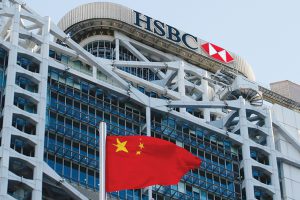HSBC Holdings Plc and Standard Chartered Plc raised their main lending rates in Hong Kong again on Thursday, a move that will push borrowing costs higher for property owners as the economy continues to face massive strain.
HSBC, the city’s biggest lender, said it is raising its prime rate by 25 basis points to 5.375% after the Hong Kong Monetary Authority (HKMA) increased its base rate earlier in the day. Rival Standard Chartered also said it raised its best lending rate by 25 basis points to 5.625%.
The HKMA raised its benchmark interest rate by 75 basis points to 4.25% on Thursday, hours after the US Federal Reserve did the same. Hong Kong’s de-facto central bank raises rates in tandem with the Fed, given the local dollar’s peg to the US dollar, and has done so six times this year.
The higher commercial bank rates will “be a big blow to consumer and business spending and will strip optimism away,†said Heron Lim, an economist at Moody’s Analytics. He said prime rates in Hong Kong may even reach 5.75% by December after the next Fed meeting.
Hong Kong’s banks for months this year kept their prime rates steady, but began raising them in September as the city’s monetary policy tightening became more aggressive. The move that month by HSBC and Standard Chartered to hike their rates was the first time those banks had done so since 2018.
At that time, HSBC’s Hong Kong chief executive Luanne Lim signaled that the lender was at the “beginning of an upward cycle.†The three-month interbank rate has already reached its highest level since the global financial crisis in October 2007.
Higher borrowing costs add to headwinds facing Hong Kong’s economy, which has been buffeted by weak global demand, a slow reopening after years of pandemic isolation, and a talent exodus amid political turmoil. Officials announced this week that gross domestic product shrank 4.5% in the third quarter, far worse than expected, and Hong Kong seems likely headed for its third annual contraction in four years.
The data showed a sharp contraction in investment last quarter, a sign that rising borrowing costs are curbing demand, especially in the property market, which had previously enjoyed more than a decade of low, stable borrowing costs.
After the monetary authority raised its rates again, HKMA Chief Executive Eddie Yue warned the public to prepare for further increases in commercial interest rates and the Hong Kong dollar interbank rates.
Continuous rate hikes, though, “will not affect the financial and monetary stability of Hong Kong,†he said in a statement. “Our monetary and financial markets continue to operate in a smooth and orderly manner.â€
The Fed’s aggressive monetary tightening has also raised concerns about the sustainability of Hong Kong’s linked exchange rate system.
—Bloomberg
 The Gulf Time Newspaper One of the finest business newspapers in the UAE brought to you by our professional writers and editors.
The Gulf Time Newspaper One of the finest business newspapers in the UAE brought to you by our professional writers and editors.
